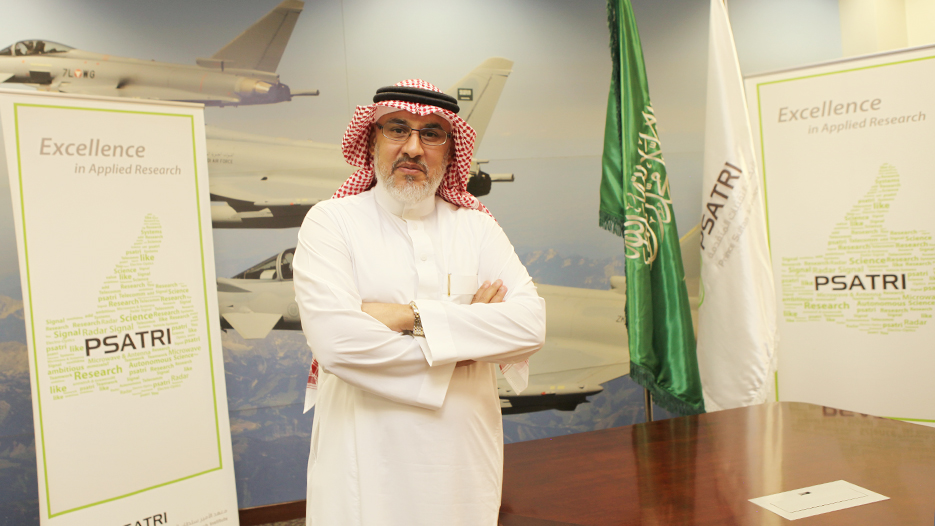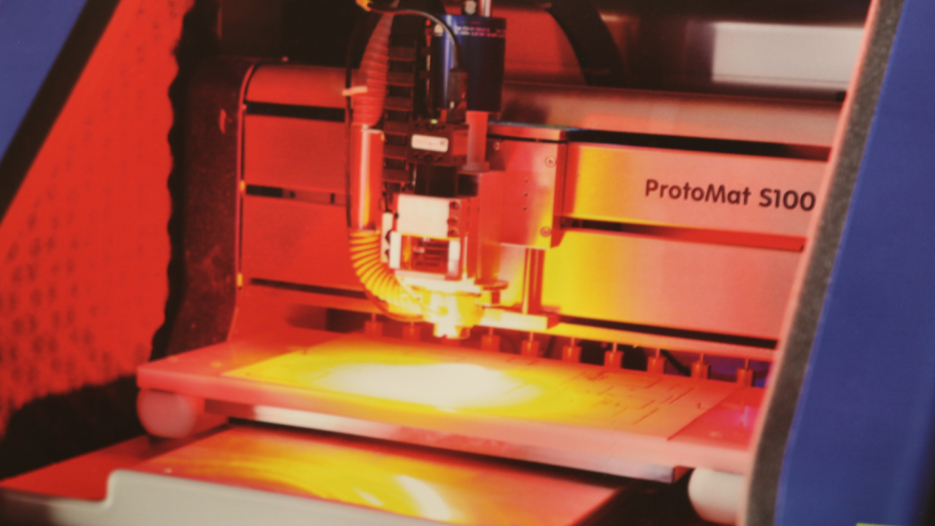Between 2013-2025, GCC countries will spend 1 trillion on defense
Between 2013 and 2025, GCC countries will have spent roughly 1 trillion on defence and about 30% of this is dedicated to capital expenditures. If a 35% offset requirement is enforced this means that 105 billion could either be invested or sourced domestically creating more than 280,000 jobs.
Interview with Dr. Sami Alhumaidi, Managing Director of PSATRI

Between 2013 and 2025, GCC countries will have spent roughly 1 trillion on defence and about 30% of this is dedicated to capital expenditures. If a 35% offset requirement is enforced this means that 105 billion could either be invested or sourced domestically creating more than 280,000 jobs. There is a lot of opportunity in the offset program. How do you view the offset program itself, the effect it had on the economy and its implications for the future?
Saudi Arabia started the offset program more than 25 years ago. It had some very optimistic views and we had set goals and objectives. I don’t believe that the offset program so far has achieved those objectives and goals. The objectives of the offset program to create jobs and diversifying the economy of Saudi Arabia have not succeeded yet. There has to be a lot more attention given to the offset program to make sure that it is closer to achieving its objectives.
The offset program needs more attention, it needs laws to control it, and it needs better governance. The supervisory committees of the offset programs need to enforce the offset objectives more strongly. The offset program needs to be assessed and reviewed periodically and corrective actions must take place. I am not very happy with the offset program right now. It has done parts of its objectives but it still has a long way to go.
I am not very happy with the offset program right now. It has done parts of its objectives but it still has a long way to go.
What are the main challenges for research and development/innovation in Saudi Arabia?
There are many challenges. Many people like to blame the funding. The funding is not the principal issue, there is enough funding in the country, however the culture and the society is to blame. The society has got used to seeing innovation coming from abroad. From the beginning, in the 70s and 80s, we started seeing innovations coming in from Europe, America, and Japan.
It will take time to convince society that the same innovation could come from within and that the engineers and scientists of Saudi society that were educated in the best universities of the world are capable of creating such innovation. If we can make that social and cultural change, we can take Saudi Arabia into a different level of innovation cycles. I also believe that the universities must be given the chance to play a major role. The university role in innovation is critical across the world. Usually innovation starts in university labs.
Universities in Saudi Arabia are still more educational than research and innovative institutes. We need to try to transform our universities to become more innovative and to look into the innovation cycle and within that give the certificates and degrees that they are giving, but not to focus on the certificates and degrees and ignore the innovation and research and development.

Saudi Arabia has one of the largest defence budgets in the world. There are no exact figures but the Stockholm Institute estimates it is about 80 billion dollars annually spent on defence each year. This is a huge number and this money is mostly spent on the procurement of foreign technology, which if it is spent properly could go into research in Saudi Arabia or into developing its own home grown defence industries. What are the investment opportunities in the defence sector?
The offset program needs to pay more attention to small and medium enterprises, and encourage the younger generation of Saudi Arabia to become more competitive, more entrepreneurial. The entrepreneurial culture in Saudi Arabia needs to be built. The defence industry is one of the industries in the world that could offset to other industries.
Instead of the classic approach of trying to create gigantic companies we now need to focus on small and medium enterprises and encourage the young generation to become more creative and innovative. We need to make sure that the supply chain for all the major defence contractors is available within the country so that they can source all of their components within the country rather than buying from abroad. If we manage to get that supply chain up and running in the country, eventually that will lead to other industries and the country will now start the cycle of becoming an industrial country.
The government is making effort with the appointment of Mohamed Al-Mady, former chairman of SABIC to lead Military Industries Corporation. The Ministry of Defence is reforming and updating its foreign procurement policies and so we are polarising ourselves in the defence area to improve the defence industry in the country and encourage defence contractors to source locally rather than from abroad.
Can you mention some of these initiatives that are taking place in the Ministry of Defence?
For example, the Minister of Defence hired one of the vice presidents of Aramco to come and lead a team to study the foreign procurement policies and right now they are deliberating and we are expecting some good results out of this effort.

You also said that the number of defence companies in the Kingdom is insufficient and the industry is developing too slowly. What reforms should be adopted to address this issue? There were about 5 companies that were created by the offset program.
The former offset strategy was to focus on big companies with aim to create major international defence companies. This approach has not worked as there is limited job creation and technology creation. The policy needs to change. It is paramount to create an environment supportive of small and medium defence companies, encourage Saudi engineers and scientists to start up new companies. Instead of 5 companies why not have 500 companies? If we start with 500 companies, let’s assume that only 200 will be successful and so that will have enough seed to lead into a defence industry in the country.
If we start with 500 companies, let’s assume that only 200 will be successful and so that will have enough seed to lead into a defence industry in the country.
Do you think of any country that has successfully developed their defence industry that could be a benchmark?
What come to mind immediately are two countries that I have visited. Turkey is one of them, it is in the region and we are trying to learn from their history. The other is South Korea, which again took very good advantage of the offset program and created a very reputable defence industry.
We have visited both countries and we have delegations constantly. I personally was with a delegation recently in South Korea and we also visited Turkey. The undersecretary of the Defence Minister was here visiting us and we were discussing their approach to offset.
As I told you, a lot of committees and groups within the Ministry of Defence are right now studying, deliberating and trying to rewrite the defence offset policies and laws in the country.
How are you contributing to transforming the Saudi economy to a knowledge based economy? What are your major milestones and your mission?
PSATRI is focused just on defence sector. The vision is that PSATRI becomes one of the major defence research agencies in the country, where we would prove to our colleagues in uniform that the technology that comes from within is just as good as the technology that comes from abroad.
The change is happening as many of the officers that we interact with are starting to trust the Saudi engineers and scientists and they are starting to share with us some of their challenges and problems. Solutions developed by PSATRI are now being seriously considered.
The plan is that some technologies that come out of PSATRI in the near future could be transformed into products for the industry in the country and end up in the hands of the end user in the military. That is the major milestone, if we achieve that it means that we have succeeded not only in innovating and creating a technology but also in transforming that technology into a product which is not an easy step to do.
It also means that we have managed to get an industrial partner to take our technology and produce it in mass production and to have it supported. At the same time it means that the end user now trusts the product which started here in the country and will use it in the field. That will be a major milestone for PSATRI.
The people in uniform always want to use the best technology. They are working in a very challenging environment and they cannot take anything less than the best in the world. We need to convince them that our technology is at the same level if not better than the best technology that is coming from the best industrial countries in the world. That is not an easy thing to achieve.
If they don’t rely on Saudi sourced material or Saudi knowledge it will never develop.
There is a lot of positive developments. The military is more relying on Saudi made technology and solutions. Now they are involving us in evaluating technologies and products that are coming from abroad which means that they now realise that the knowledge and the experience we have is crucial to their success. With time we will reach the stage where they will prefer the Saudi technology over the technologies from abroad.
The number of patents awarded in the US to Saudi Arabia increased from 12 in 2001 to 294 in 2014. Still on the per capita, the figure is low compared to countries such as Finland.
Saudi Arabia is the leading Arab nation the number of publications and patents. You know that the Saudi government started the science, technology and innovation policy which lead to a program that is managed by King Abdulaziz City for Science and Technology to encourage this area.
We finished the first five year cycle and now we are starting the second five year cycle. It made a huge impact on the number of patents and publications, putting Saudi Arabia among the leading Arab nations in this field. We are doing very well and shall keep increasing that number.
Can you talk about your strategy and vision for the institution?
Our strategy is really to achieve the goals and objectives that the Ministry of Defence has established for us. PSATRI was started by the Ministry of Defence seven years ago and they gave us the objectives and the goals. Our strategy is to achieve those goals through innovation and creativity. Right now PSATRI has five labs, we have an unmanned systems lab, microwave and radar labs, signal and image processing labs, a communications networking lab and we have an electro-optics lab.
We are trying to focus on our unmanned systems and on reconnaissance and surveillance systems. The first goal that we would like to achieve is to make sure that some of these systems that we are right now innovating and developing will end up in the hands of the end user who will trust it and then that will create a cycle where further innovation will come and be trusted.
This is my vision, to make PSATRI a major defence research agency for the country that will encourage the industry in the country to become more risk taking and more entrepreneurial. We are hoping to see PSATRI helping the defence industry grow tremendously in the country.
We are hoping to see PSATRI helping the defence industry grow tremendously in the country.
Is there availability of funding for companies?
There is a lot of availability for funding but not coming directly from the Ministry of Defence, if you noticed recently the Ministry of Trade and Industry is creating a lot of initiatives in small and medium enterprises. We also have loans made available from different organisations to small companies. We have many incubators in the country. King Saud University and King Abdulaziz University have an incubator. It is the lack of entrepreneurial culture that is hindering us. Our young generation prefers stable jobs in the private sector or government owned companies and they are not willing to take the risk in becoming entrepreneurs.
Lastly, can you tell us a bit about the defence sector itself, the outlook, its growth, the potential?
It is obvious from what is happening in the region right now that defence is going to be a focus not only for Saudi Arabia but for many countries in the GCC and in the Middle East. As you know, in the past fifteen or twenty years Saudi Arabia focused a lot on education and on medical fields, so defence was not the highest priority. Therefore, there is a lot of defence equipment and facilities that need to be upgraded now.
We will see in the near future major contracts in the sector so there will be huge growth in defence in the country and in the region. We are hoping that this will lead into a growth in the entire defence industry here.